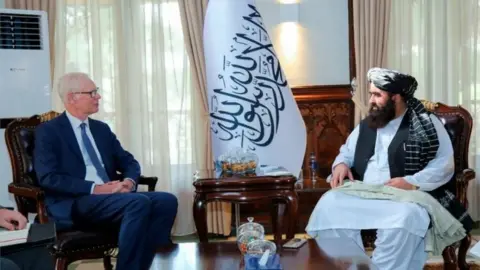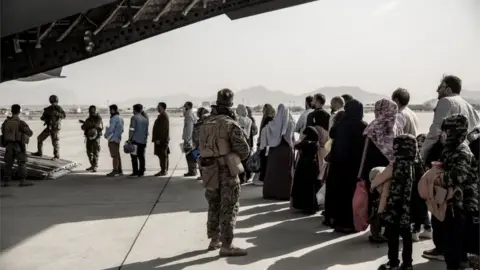UK diplomats meet Taliban leaders in Afghanistan
 Reuters
ReutersUK officials have travelled to Afghanistan to meet senior Taliban members, the Foreign Office has said.
The UK government said they discussed how the UK could help address the humanitarian crisis, prevent terrorism and the need for a safe passage for those who wish to leave the country.
They also raised the rights of women and girls and treatment of minorities.
UK troops left Afghanistan at the end of August, bringing an end to a 20-year military involvement in the country.
Their departure came as Taliban troops rapidly advanced through the country overthrowing the Afghan government.
British embassy staff in Kabul were forced to evacuate the country to escape Taliban forces and are temporarily based in Qatar.
Terrorism
Wednesday's meeting marks the first time British officials have gone back to Kabul to meet the new Taliban leadership.
As part of efforts to open up channels of communications with the Taliban, Sir Simon Gass, the prime minister's high representative for Afghan transition and Martin Longden chargé d'affaires of the UK mission to Afghanistan in Doha travelled to the country.
They met senior Taliban leaders including Foreign Minister Mawlawi Amir Khan Muttaqi and the Deputy Prime Ministers Mullah Abdul Ghani Baradar Akhund and Mawlawi Abdul-Salam Hanafi.
 Reuters
ReutersThe Foreign Office said: "Sir Simon and Dr Longden discussed how the UK could help Afghanistan to address the humanitarian crisis, the importance of preventing the country from becoming an incubator for terrorism, and the need for continued safe passage for those who want to leave the country.
"The government continues to do all it can to ensure safe passage for those who wish to leave, and is committed to supporting the people of Afghanistan."
'Constructive relations'
Abdul Qahar Balkhi, a spokesman for the Taliban, said the meeting focused on "detailed discussions about reviving diplomatic relations between both countries".
He said the two countries should "begin a new chapter of constructive relations" adding: "We expect others to also not work towards weakening our government."
The BBC's diplomatic correspondent James Landale said the meeting did not mean the UK was officially recognising the Taliban as the legitimate rulers of Afghanistan, only that it wanted to establish communications.
He added that aid was one of the levers the west has and would be a key part of the negotiations, with non-governmental organisations fearing the collapse of the Afghanistan economy could lead to a humanitarian crisis.
Following the meeting Mr Longden tweeted: "It's early days and, unsurprisingly, there are points of difference between us.
"But such difficult challenges lie ahead for Afghanistan (and beyond), it's right to test if we can engage pragmatically and find common ground - in the interests of both the UK and Afghan peoples."
Prime Minister Boris Johnson has previously said it would "be a mistake for any country to recognise any new regime in Kabul prematurely or bilaterally".
Instead, he added, "those countries that care about Afghanistan's future should work towards common conditions about the conduct of the new regime before deciding, together, whether to recognise it and on what terms".
Meanwhile, Qatar's ruler, Sheikh Tamim bin Hamad Al Thani has warned that "boycotting" the Taliban would "only lead to polarisation and reactions, whereas dialogue could be fruitful".
